Treatment of Prostate Cancer with Actinium-225 PSMA
Treatment prices are regulated by national law of the corresponding countries, but can also include additional hospital coefficients. In order to receive the individual cost calculation, please send us the request and medical records.
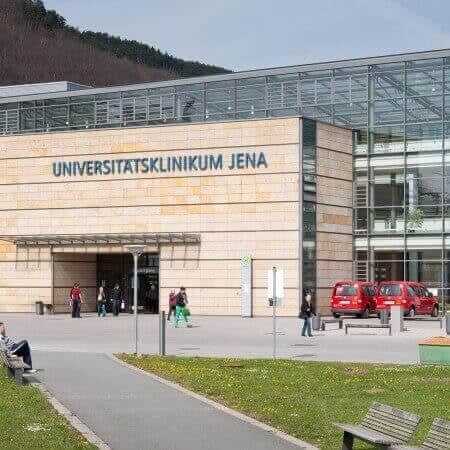
Department of Nuclear Medicine
The Department of Nuclear Medicine offers the full range of radioisotope diagnostics and treatment using the state-of-art gamma cameras and PET-CT systems. The main therapeutic facilities of the department include radioiodine therapy, selective internal radiotherapy, peptide-receptor radionuclide therapy. All medical services comply with the guidelines of national and international professional societies, which ensures an accurate diagnostics and optimal treatment outcome.
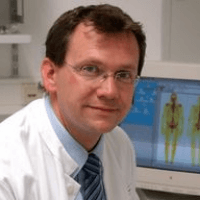



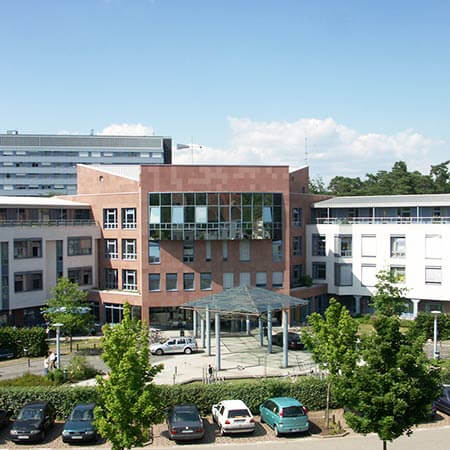
Department of Nuclear Medicine
The Department of Nuclear Medicine offers patients the full range of modern methods of diagnostics and treatment using radioactive isotopes. The department actively carries out the very latest radioisotope tests, such as scintigraphy, PET/CT scans, and SPECT/CT scans. These procedures allow doctors to assess the metabolic processes in the body, due to which many pathologies are detected in their early stages, which significantly increases the chances of their successful cure. As for the treatment, of particular interest is the treatment of thyroid diseases and oncological pathologies. The department's doctors successfully carry out radioiodine therapy, radiosynoviorthesis, selective internal radiation therapy, peptide receptor radionuclide therapy, and other therapeutic procedures. Treatment with radiopharmaceuticals is highly effective and practically does not cause any side effects. The department is certified by the German Cancer Society to treat many types of cancer. The department is the largest medical facility of this kind in Southwest Germany and offers patients top-class medical services.



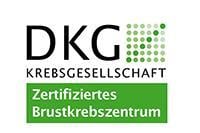
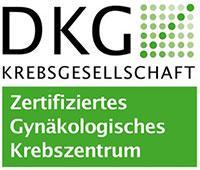
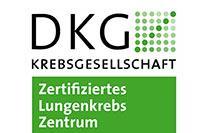
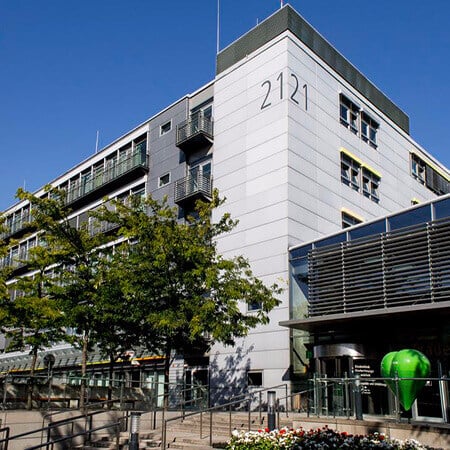
Department of Nuclear Medicine
The Department of Nuclear Medicine offers the full range of diagnostics and treatment with therapeutic radionuclides. The department has been carrying out successful clinical activities for over 60 years, and therefore it has vast experience and outstanding achievements. The department has state-of-the-art medical equipment, thereby providing each patient with optimal medical care that meets the highest international standards. A special focus is placed on the treatment of benign and malignant thyroid diseases. The department cooperates closely with the specialized centers for breast cancer, prostate cancer, lung cancer and skin cancer. The specialists in the field of nuclear medicine also actively cooperate with doctors from the Comprehensive Cancer Center Dresden. Most diagnostic examinations are carried out on an outpatient basis, and therapeutic interventions most often take place in an 18-bed inpatient medical facility – one of the largest of this kind in Germany.





Radionuclide therapy is one of the best treatment methods for metastatic prostate cancer in terms of effectiveness and safety. It even works when hormone therapy and chemotherapy no longer provide a positive effect. Doctors in Europe most often use lutetium-177 and actinium-225 for radionuclide therapy. These radioactive substances are injected intravenously. They affect not only the primary tumor, but all metastatic foci. The damage to healthy tissues is minimal, since radionuclides accumulate only in cancer cells.
Content
- What is PSMA therapy
- When can Actinium-225 be used
- Features of radionuclide therapy with actinium-225
- Treatment results
- Benefits of PSMA therapy
- Why is it worth undergoing prostate cancer treatment abroad
- Treatment in Europe with Booking Health at an affordable price
What is PSMA therapy
Nuclear medicine is one of the very latest advances in oncology. The problem of treatment for metastatic cancer is the impossibility to irradiate all tumor foci. First, it is unsafe because the radiation dose is too high. Secondly, it is simply impossible to detect all metastases, since some of them are very small.
However, PSMA therapy can successfully solve this problem. Doctors inject a radiopharmaceutical agent intravenously, which detects all cancer cells and destroys them with radiation.
The radiopharmaceutical agent consists of two components:
- Ligand – a molecule, which can bind to a particular other molecule.
- Radionuclide – a source of radiation.
A ligand can interact with a particular target. It circulates in the blood until it finds its target. In the case of prostate cancer, this target is PSMA – prostate-specific membrane antigen. The ligand marked with a radionuclide attaches to this protein, the content of which on the surface of cancer cells is several hundred times higher than in healthy tissues. As a result, the radiopharmaceutical agent accumulates only in the tumor.
PSMA therapy may involve the use of various radionuclides. Lutetium is the most widespread in nuclear medicine for prostate cancer. Other substances are less commonly used. Doctors in some European hospitals use the actinium-225 for PSMA therapy.
When can Actinium-225 be used
Radionuclide therapy is used for metastatic prostate carcinoma.
There are three main methods in medicine to fight cancer: surgery, irradiation, and chemotherapy. In the case of prostate cancer, hormone therapy also provides good results.
Surgery and irradiation are the best options for patients with localized or locally advanced cancer. In other words, prior to the spread of distant metastases. Radiation therapy and surgery are interchangeable techniques. Each of these treatment methods can help cure prostate cancer, even without additional therapy.
However, some patients are diagnosed with prostate cancer only after the spread of metastases. They most often occur in distant lymph nodes and bones. In such cases, hormone therapy is the next treatment. If it does not work, chemotherapy is prescribed. Chemotherapy can sometimes be carried out simultaneously with hormone therapy: if the tumor is large, aggressive and has spread a large number of metastases.
Patients with metastatic prostate cancer have to undergo treatment all their lives, because even after reaching remission, the disease periodically recurs. Doctors use mainly systemic methods, but sometimes they supplement them with procedures for local control of the tumor: for example, they carry out irradiation or prostatic artery embolization.
At a certain point, neither hormone therapy nor chemotherapy works anymore. The disease continues to progress despite the ongoing treatment. In this case, doctors resort to radionuclide therapy. With a good response to treatment, it can restrain the progression of cancer pathology for several more years. Even after a single injection of the radiopharmaceutical agent, the tumor and metastases completely disappear in some patients. This phenomenon is called complete response to treatment. It is ascertained if, according to the results of radiation diagnostics, tumor foci are no longer detected.
Lutetium is commonly used in patients undergoing treatment with PSMA therapy. However, not all patients respond to this therapy. Lutetium gives beta radiation. If it does not help destroy cancer cells, more powerful alpha radiation is used. Actinium-225 is mainly used in patients who have not been able to get good results after using lutetium-177.
Features of radionuclide therapy with actinium-225
Various radionuclides can be used for PSMA therapy. They can emit alpha or beta radiation. Lutetium-177 is the most widespread one. It is a source of beta radiation. At the same time, such alpha emitters as actinium-225, radium-223, bismuth-213, astatine-211 are used in many hospitals.
Alpha radiation is a stream of positively charged particles, which are composed of two neutrons and two protons. Alpha particles have 8,000 times the mass of beta particles. They differ in that they have a short range in tissues – from 50 to 100 microns. Alpha particles release large amounts of energy over short distances. The damage caused by actinium-255 is 3-7 times stronger than by lutetium. THe death of cells is achieved through irreversible double-stranded DNA breaks. Cancer cells cannot repair such breaks, so they die.
The use of actinium as a radionuclide for PSMA therapy has the following benefits:
- Possibility of using in smaller doses to achieve a similar therapeutic result.
- There is practically no irradiation of the tissues next to the tumor, because the alpha radiation extends over a very short distance (fractions of a millimeter).
- Efficiency does not depend on the presence of hypoxia in the tumor, since the mechanism of destruction of cancer cells is not associated with the formation of reactive oxygen compounds.
- Effect does not depend on the chemoresistance of the tumor.
The accuracy and safety of such injected alpha emitters as actinium-255 is comparable to proton therapy. However, unlike it, doctors can irradiate not only large, but even the smallest tumor foci, including those, which have not yet been detected during diagnostics.
Actinium-225 is considered one of the best alpha emitters. Its half-life is 10 days. When decaying, three nuclides emitting radiation are formed: francium-221, astatine-217 and bismuth-213. The only disadvantage is the high cost of obtaining this substance. Therefore, radionuclide therapy with its use can be more expensive as compared to other options for PSMA therapy.
Treatment results
The radiopharmaceutical agent is injected intravenously to a patient. After this procedure, the person spends several days in the hospital.
Several courses are required in total. As a rule, the intervals between injections of the radiopharmaceutical agent are 8 weeks. The radiation dose gradually decreases.
The results of a research by M. Sathekge, F. Bruchertseifer, O. Knoesen et al. were published in 2019. The treatment using actinium was provided to patients who had not yet been treated with chemotherapy. The results were quite impressive:
- PSA levels (the main marker of prostate cancer) in 82% of patients have decreased by 10 times or more.
- PSA levels in 42% of patients have decreased to the undetectable levels.
- Complete response to treatment has been achieved in 64,7% of the subjects – all tumor foci (primary tumor, metastases in bones and other organs) have disappeared.
Remission of the disease was achieved after 2-3 injections of the radiopharmaceutical agent, which lasted for more than 1 year.
Thus, the method is highly effective even at the advanced stage of cancer. With the help of actinium PSMA, a person's life expectancy can be increased by several years, while the quality of his life can be improved.
Benefits of PSMA therapy
The main advantage of PSMA therapy is that it works in cases when other treatment methods are ineffective. This is the last treatment option for prostate cancer if chemotherapy fails or has too many side effects.
PSMA therapy is highly safe and well tolerated. Many patients have no side effects at all, which never happens with chemotherapy. If side effects develop, they are mainly related to grade 1-2 toxicity. It is most often nausea or dry mouth.
Grade 3-4 toxicity is extremely rare. It is mainly associated with the accumulation of the radiopharmaceutical agent in the bone marrow and suppression of hematopoietic function. This happens if metastases of prostate cancer have spread to the bones. However, modern medicine can successfully cope with this problem: patients are given transfusions of blood and its components.
PSMA therapy is used even in patients for whom other treatment options are contraindicated. It is often used in elderly, weakened people with comorbidities of internal organs.
Why is it worth undergoing prostate cancer treatment abroad
The very latest methods of prostate cancer treatment, including PSMA therapy, are used abroad. Radionuclide methods are used mainly in countries with developed medicine.
You can go abroad to undergo PSMA therapy. There are several reasons for you to undergo prostate cancer treatment abroad:
- Not only conventional chemotherapy and hormone therapy are used for metastatic prostate cancer, but also PSMA therapy. It works even in cases when the disease cannot be controlled in other ways.
- Various radionuclides are used for PSMA therapy, including lutetium and actinium.
- High-precision diagnostics: with the help of radionuclide tests, doctors not only detect all distant metastases, but also predict the response to PSMA therapy.
- The safety of prostate cancer treatment: when conducting PSMA therapy, doctors cool the salivary glands, inject solutions to protect the kidneys. Kidney function is constantly monitored through tests.
- Successful combination of PSMA therapy using Actinium with other treatment methods for prostate cancer: remote irradiation, cryoablation, chemoembolization, drug therapy.
Treatment in Europe with Booking Health at an affordable price
To undergo PSMA radioligand therapy in one of the European hospitals, please use the services of the Booking Health company. On our website, you can see the cost of treatment in different hospitals, compare prices and book a medical care program at an affordable price. The cost of treatment with Actinium-225 for prostate cancer with bone metastases is between 25,050 EUR and 39,150 EUR. The treatment in the department of nuclear medicine of a European hospital will be easier and faster for you, and the cost of prostate cancer treatment will be lower.
Please leave your request on the Booking Health website. Our employee will contact you and provide a consultation about treatment in Europe. Booking Health will take care of the organization of your trip. We will provide the following benefits for you:
- We will choose a hospital for treatment in Europe, whose doctors specialize in nuclear medicine.
- We will help you establish communication with your attending physician and hospital staff.
- We will reduce the waiting time for the medical care program and book a doctor's appointment on the most suitable dates.
- We will reduce the price. The cost of treatment in European hospitals will be decreased due to the lack of coefficients for foreign patients.
- We will take care of all the organizational issues for organizing the trip: documents for entering the country, transfer from the airport, hotel, interpreting services, etc.
- We will prepare a medical care program and translate medical records. You do not have to undergo previously performed diagnostic procedures.
- We will help you keep in touch with the hospital after treatment in Europe.
- We will organize additional examinations and treatment in European hospitals, if necessary.
- We will buy medicines abroad and forward them to your native country.
- We will help you keep in touch with the hospital and the attending physician after treatment in Europe.
You will be treated by the best doctors in the world. The employees of Booking Health will help reduce the cost of treatment and take care of all organizational issues, and you will only have to focus on restoring your health.
Authors:
The article was edited by medical experts, board certified doctors Dr. Nadezhda Ivanisova and Dr. Vadim Zhiliuk. For the treatment of the conditions referred to in the article, you must consult a doctor; the information in the article is not intended for self-medication!
Our editorial policy, which details our commitment to accuracy and transparency, is available here. Click this link to review our policies.
Sources:

